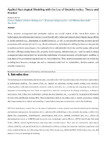Please use this identifier to cite or link to this item:
http://lib.hpu.edu.vn/handle/123456789/22696| Title: | Empirical Modeling and Its Applications. Chapter 4: Applied Hydrological Modeling with the Use of Geoinformatics: Theory and Practice |
| Authors: | Chalkias, Christos Stathopoulos, Nikolaos Kalogeropoulos, Kleomenis Chalkias, Christos Stathopoulos, Nikolaos Kalogeropoulos, Kleomenis |
| Keywords: | Computer and Information Science Numerical Analysis and Scientific Computing Hydrological modeling GIS Hydrology Unit hydrograph Floods |
| Issue Date: | 2016 |
| Publisher: | INTECH Open Access Publisher |
| Abstract: | Water resource management and catchment analysis are crucial aspects of the twenty-first century in hydrological and environmental sciences. Linked directly with studies and research about climate change effects in global resources (e.g., diminution of rainfall dynamic), as well as continuously growing extreme natural phenomena with catastrophic results (e.g., floods and erosion), hydrological modeling has become a key priority in modern academic research goals. On a national or lower administrative level, the need for coping with natural disasters—affecting mainly human life, property, local economy, infrastructure, etc.—and the need to design management plans and projects for sustainable exploitation of natural resources set hydrological modeling in high demand by government organizations and local authorities. Thus, hazard assessment and risk evaluation modeling have become a strategic aim and an extremely useful tool for stakeholders, decision-makers, and scientific community. |
| URI: | https://lib.hpu.edu.vn/handle/123456789/22696 |
| ISBN: | 978-953-51-2494-8 |
| Appears in Collections: | ICT |
Files in This Item:
| File | Description | Size | Format | |
|---|---|---|---|---|
| 77_EmpiricalModelingandItsApplications_.pdf | 964.08 kB | Adobe PDF |  View/Open |
Items in DSpace are protected by copyright, with all rights reserved, unless otherwise indicated.
